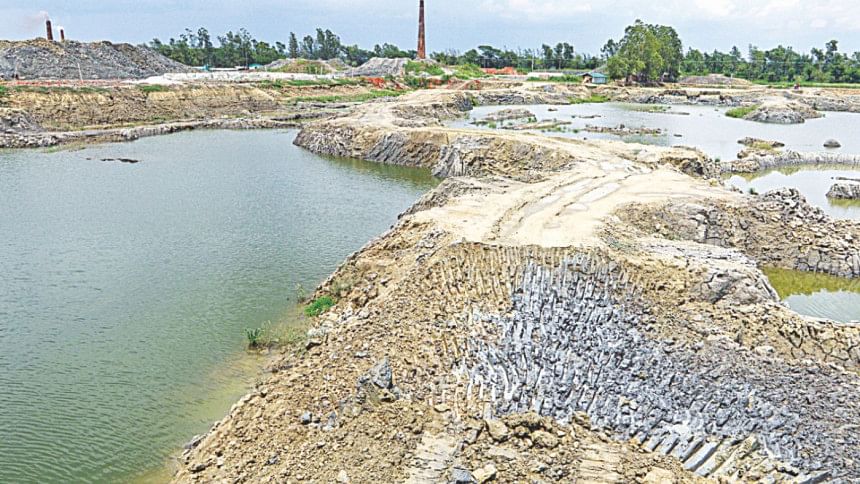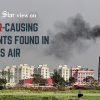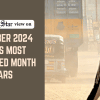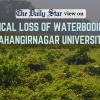Commentary: So what else are we going to rob?

A new kind of robbery is wreaking havoc in some parts of our countryside. A robbery that forms a part of a far bigger picture of destruction of our ecology and thereby robbing our future generations of their chance to lead a healthy and prosperous life.
This new “theft” is stealing the fertile top soil from our precious and scarce land.
According to a recent report in The Daily Star, top soil is being stolen or taken away forcibly to feed the kilns to produce bricks.
Our highly fertile land is being turned barren because the precious top soil, which is really what lends a land all its productive quality, is being sliced away several feet from the top and sold to the brick kilns. As seen in the photos in this newspaper, the multi-crop yielding highly fertile land that gives Bangladesh its enviable landscape is looking more and more like satellite photos of the Moon or Mars.
An organised gang of local political high-ups, criminals, thugs and perhaps brick producers themselves are doing it with possible connivance of the local administration and police.
It's happening in Chittagong's Satkania area and is a daily occurrence when the law says it is illegal to collect top soil from agricultural land, hills, wetlands, etc. In fact, it is illegal to even set up brick kilns near agricultural land.
So we are forced to ask the question, what else are we going to rob our future generations of?
I think it was water that we stole first from our future generations. The incessant, unthinking, reckless and unplanned extraction of groundwater so depleted our underground reservoir that in 62 upazilas water level has fallen below seven metres going down to 11 metres in the dry season.
In agricultural lands in many districts, farmers are unable to draw water with shallow tube wells and have to turn more and more to deep tube wells to water crops. The districts include Sherpur, Jamalpur, Tangail, Natore, Kushtia, Pabna, Mymensingh, Manikganj, Dhaka, Narsingdi, Sirajganj, Comilla, Cox's Bazar and their adjoining areas.
Here we must mention that the problem of arsenic in underground water emerged only after extraction hit a certain acute level.
All this was done mainly to achieve self-sufficiency in food production. We did, but in the process we have created a fresh water crisis that may jeopardise the very success we are so boastful about today.
Then we stole air -- literally their right to breath -- from our children by poisoning our urban air with all sorts of pollutant.
Dhaka today is the third most polluted city in the world, after Delhi and Cairo, respectively the most and second most polluted cities in the world.
To take comfort that the Indian capital is worse than ours is also to ignore that Kolkata, which just the other day was among the dirtiest cities in the world, has done a far better job than Dhaka, leading to the question as to why we are not learning from the latter.
Air pollution is a global problem with, according to the World Health Organisation, 90 percent of the world's population being exposed to polluted air -- the blame for this can be passed off as a civilisational folly. Yet there is no denying the fact that we could have taken many measures to improve our situation but we didn't.
The Detailed Area Plan (DAP) for Dhaka and its outskirts is a clear example of the utter disdain of our policy makers towards issues of ecology, environment and sustainability.
The plan that took millions of dollars of donor money and years in making has been repeatedly amended to make way for the land grabbers and greedy developers who, collectively, now pose the greatest of threats to Dhaka's sustainability.

We also stole our forests from our future generations.
Many countries have had to trim their forest reserves to make roads, set up industries and expand cities. But few did so in such an unplanned and reckless manner.
The continuous cutting down of our trees without any comprehensive planning for replanting now makes Bangladesh one of the countries with lowest forest coverage.
I wish those who talk of “Mahathir model” of governance to justify authoritarian rule, would take “Mahathir model” of town planning and apply it in our case.
Anybody who has visited Kuala Lumpur or any other Malaysian town would instantly understand what I am talking about with, perhaps, the exception of our ministers, political leaders, town planners, high-level bureaucrats -- many or most of whom have visited Malaysia, many several times and found nothing to learn except that Mahathir did not give sufficient space to the opposition and the press.
Perhaps our greatest theft from the future generations has been the systematic destruction of our rivers.
As a deltaic plain, Bangladesh is a direct product of its rivers. There are very few countries in the world whose creation is so directly linked to the sedimentation by its rivers -- a fact that explains both the enviable fertility of our soil and our vulnerability to flooding.
To put it differently, there is no existence of Bangladesh without its rivers, and relationship between the two is the fundamental reality of our very existence.

Yet we have been so cavalier in dealing with this simple, clearly understandable, obviously visible but existential reality. If there is one single fact for which our future generations would hold us responsible for destroying their prospect of a healthy, balanced and prosperous future, it will be for the fact that we have killed the very rivers that gave us and would have given them the sustenance of life.
The destruction has been of two types -- quantitative and qualitative, one dealing with the physical destruction of the rivers by occupying the land that “belonged” to them and the other is damaging its water quality including the killing of most if not all marine lives that it supports.
According to the Department of Environment, all rivers around Dhaka city are biologically dead, meaning that a minimum presence of oxygen level of five is needed for a river to be “alive” whereas it is between 0 and 1 in cases of all the four rivers that surround Dhaka.
This newspaper has followed this destruction and carried hundreds of reports, articles and editorials to save our rivers. But all our efforts bore no result.
Throughout the country, river banks are being taken over by local power and financial elites in connivance with land grabbers and developers, and the local administration.
The water quality of rivers outside Dhaka is not as dire as that of those within, but the former's shrinking flow area and floodplain threaten their very existence as has already happened with most of the tributaries, canals and other water bodies linked with them.
So on the one hand, we are proudly marching towards middle-income country status, and on the other hand, destroying the very nature that gives us “life”.
Is it not possible to do both?

 For all latest news, follow The Daily Star's Google News channel.
For all latest news, follow The Daily Star's Google News channel. 








Comments